Open the West coast to more pipelines and tankers!The Supreme Court of Canada has rejected the Trudeau Liberals’ bullying Impact Assessment Act, a law that essentially sacrificed on the altar of climate alarmism many thousands of jobs and billions in private investment in Canadian industry.
The court’s decision is a colossal win for Canadians who hope for better days and a thriving economy, in large part because the court’s decision is part of a trend where world leaders in business, politics and the law, credible climate scientists and regular citizens are rejecting the darkest and dumbest excesses of climate policy.
It’s evident that the majority of judges in last Friday’s 5-2 decision were concerned about just how far the Trudeau Liberals had gone in bulldozing provincial constitutional rights, including in the name of the Liberals’ preferred climate policy.
In the court’s previous ruling upholding the carbon tax, Chief Justice Richard Wagner had focused on climate being an existential threat to humanity. Not this time. Only the two dissenting judges brought up that notion.
In this ruling Wagner focused on how the federal government had “plainly overstepped the mark” in terms of invading provincial jurisdiction, including on emissions.
Canadians are now rejecting what the Trudeau Liberals are selling. The Supreme Court just did so as well.
Perhaps, after all, there is hope for a smarter and richer Canada, one with effective and non-alarmist climate policy.
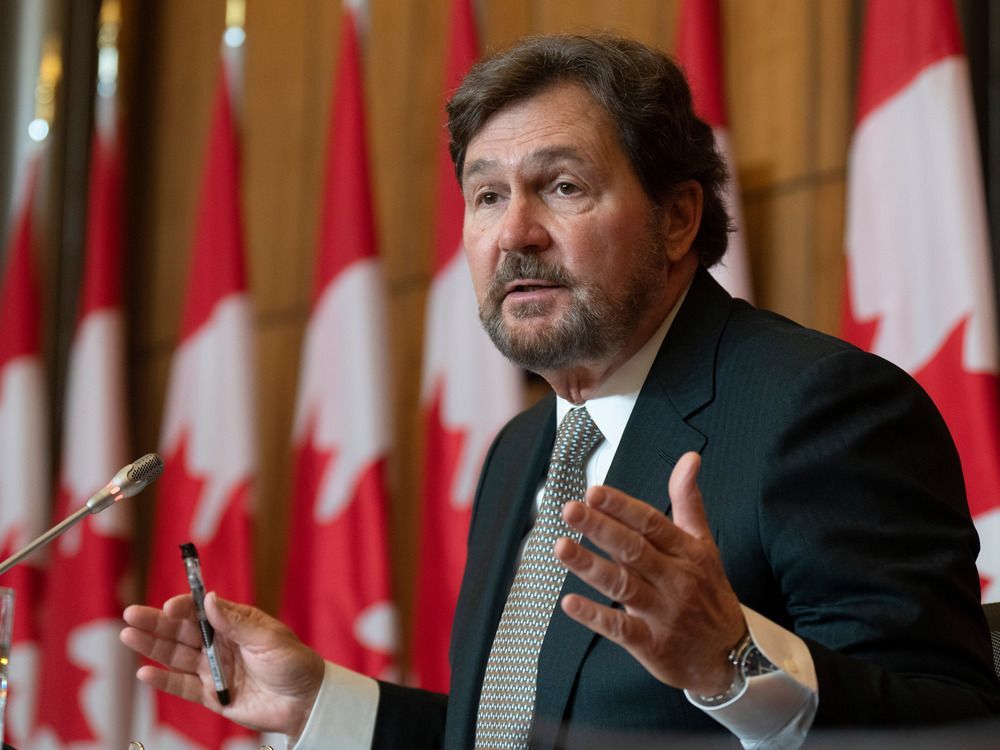
David Staples: Canada's Supreme Court rejects Trudeau's climate overreach, as does the public
There's also the hypocrisy of the climate alarm establishment, who have yet to refuse an airline flight to their next fancy conference.edmontonjournal.com
Kelly McParland: How decades of Liberal indifference created Danielle Smith
- Thread starter The_Foxer
- Start date
You are using an out of date browser. It may not display this or other websites correctly.
You should upgrade or use an alternative browser.
You should upgrade or use an alternative browser.
Canadians are now rejecting what the Trudeau Liberals are selling. The Supreme Court just did so as well.
Perhaps, after all, there is hope for a smarter and richer Canada, one with effective and non-alarmist climate policy.
From your lips to God's ears!
Perhaps, after all, there is hope for a smarter and richer Canada, one with effective and non-alarmist climate policy.
From your lips to God's ears!
According to Al Gore, the Arctic Ocean has been ice free since 2013. You could always build a pipeline that way until BC gets rid of the socialist government that hates working people.I know northern B.C. at one time did really want to join Alberta because they didn't like the Liberals in power in B.C. at the time. I'm thinking they'd still likely want to join if Alberta did decide to separate. If only we weren't landlocked we'd be so much better off. Sigh..... Separation is beginning to look better & better all the time. The next election will be interesting, that's for sure.
Unless of course I am the dictator. Then there would be pipelines running to any available salt water. Good paying jobs for everyone that want one. Those that don't can live in their parents' basement, or move to Quebec with the rest of the freeloaders.Wow. You finally did something right.
See, that's what the law is supposed to be about. In a roughly-democratic system, the people elect whom they choose. The various parties have ideologies and agendae, and the winners of those elections pass laws and make regulations to implement those. The courts say either that a given law or regulation is within their power, or it's not. The courts do not rule on the rectitude, accuracy, or propriety of the ideologies or agendae. They simply say "you may do this, you may not do that." So when the ruling party or coalition is told "you may not do that," they seek another way to implement all or part of their agenda. If enough of the people decide the ideologies or agendae have gone too far, they replace the ruling party or coalition with another that has different ideologies and agendae.
Along the way, there are plenty of lies, self-dealing, skullduggery, hugger-muggery, and jiggery-pokery.
Anyone who says they don't like this process is essentially saying what they really want is an absolute dictatorship. I disagree.
"democracy is the worst form of Government except for all those other forms that have been tried from time to time"
--Winston Churchill, 1947
Well, it's hard to argue that yer a terrific dick, tater.Unless of course I am the dictator. Then there would be pipelines running to any available salt water. Good paying jobs for everyone that want one. Those that don't can live in their parents' basement, or move to Quebec with the rest of the freeloaders.
Seriously, here is the quote:Was it a just a bad dream, or did federal Environment Minister Steven Guilbeault really make this absurd remark?
“How fair would it be for the rest of the federation if we started carving out exceptions for provinces?”
Guilbeault did say that. He was talking about his refusal to change the 2035 deadline for Alberta’s electricity grid to reach net-zero emissions.
At any distance from the federal towers of zealotry, Canada seems to be nothing but exceptions for provinces. Exceptions are how we stumble and bumble along as a nation.
Exceptions are often positive, most notably in Quebec and Ontario, or negative in provinces less politically important to the Liberals.
Guilbeault went on to say, regarding exceptions, “we didn’t do it for (carbon) pricing.
“We worked with all provinces to ensure that we had a fair and equitable system when it came to pricing, and we will do the same for the clean electricity regulations.”
That is false. Quebec’s cap-and-trade pricing system — an exception granted by Ottawa — guarantees that Quebecers pay less.
This has been known for years. The Canadian Taxpayers Federation recently said Ottawa “is forcing drivers in every other province and territory to pay 14 cents per litre of gas in carbon taxes, while Quebecers pay 10 cents per litre.”
Atlantic provinces have just started paying carbon tax after Ottawa rejected their pricing plans.
The New Brunswick government, especially, is livid. It claims the provincial plan would have cut emissions by 40 to 45 per cent below 2005 levels by 2030. That would beat the federal target by 20 years.
Quebec makes similar claims for its dubious carbon trading scheme, but that’s Guilbeault’s home province. Exception approved.
In refusing to budge on his target date for electricity, Guilbeault is actually making Alberta an exception — the negative kind.
More than 60 per cent of Alberta’s electricity generation comes from natural gas. Smith claims that transition to other sources by 2035, including some use of “abated” natural gas, simply isn’t possible without severe economic harm.
Others disagree, including the provincial NDP, which supports net zero by 2035. Rachel Notley’s party wonders, as many others do, why the province put a hiatus on green energy projects.
But there’s little doubt that Alberta and Saskatchewan have very serious challenges in meeting net zero by 2035.
Guilbeault can get tough because most other provinces have no problem at all. They’re blessed with all those dams and rivers that produce hydroelectric power. By luck of geography, they’re already most of the way to net zero.
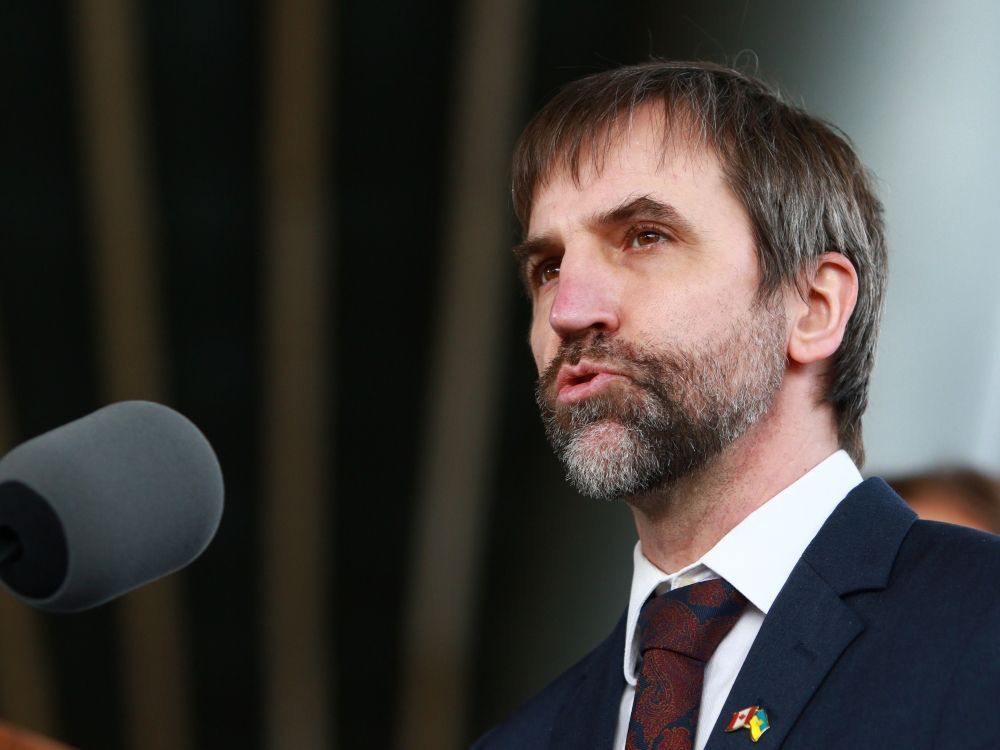
Braid: Environment Minister Guilbeault's insulting claim that he doesn't favour some provinces over others
Environment minister Steven Guilbeault say he makes no exceptions on environment rules, when the government does it every day.calgaryherald.com
Quebec has by far the most hydroelectric power. It accounts for 94 per cent of the provincial grid. Wind produces five per cent. Natural gas and petroleum are trace amounts.
Ontario is 25 per cent powered by hydro. Fifty-one per cent is nuclear. Wind and natural gas totalled about 10 per cent each.
For the Liberals’ key province, eliminating natural gas in 12 years is no problem at all.
It’s pretty much the same in B.C. (87 per cent hydro), Manitoba (97 per cent), and Newfoundland and Labrador (96 per cent).
Little Prince Edward Island, bless its heart, is 99 per cent wind-powered.
New Brunswick has the most diverse generation, with about 60 per cent nuclear and hydro. Thirty per cent comes from coal.
Nova Scotia is the only province with a problem as serious as Alberta and Saskatchewan. In recent years, 74 per cent of its power has come from coal and natural gas.
A target delay of a few years is reasonable for Alberta, Saskatchewan and probably Nova Scotia. Other provinces would likely go along without complaint, although we could expect some preaching from the Bloc Quebecois.
But Steven Guilbeault seems blind to anything but his cause. His talk of treating provinces equally is both absurd and insulting.
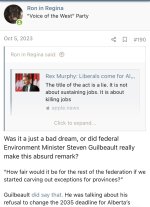
That’s three weeks ago towards Alberta & Saskatchewan, from Guilbeault. “How fair would it be to the rest of the federation, if we started carving out exceptions for provinces?” How fair indeed?
GOLDBERG: Trudeau’s home heating oil exemption shows politics trumps real affordability — Toronto Sun
It turns out desperate pigs really do fly. In a colossal policy reversal, Prime Minister Justin Trudeau announced a suspension of the carbon tax on home heating oil for the next three years. But that one concession favours one region over others and is far from enough to protect Canadians from...
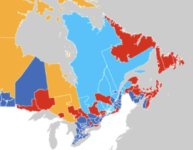
And this:
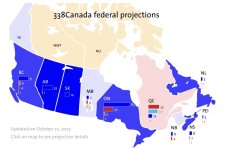
And this:

Agriculture groups again urge Ottawa to exempt farmers from carbon tax
Agricultural groups are calling on Ottawa to pass a bill that will exempt farmers from paying the carbon tax on propane and natural gas.

And this:
REGINA — Two of Canada's Prairie premiers say Ottawa's decision to exempt the carbon tax on heating oil fails to address affordability needs in Alberta and Saskatchewan.
Saskatchewan Premier Scott Moe and Alberta Premier Danielle Smith say the exemption should also be applied to natural gas, as the majority of people in the provinces use it to heat their homes.
Smith says she's disturbed by the measure, adding it further creates a divide in the country.
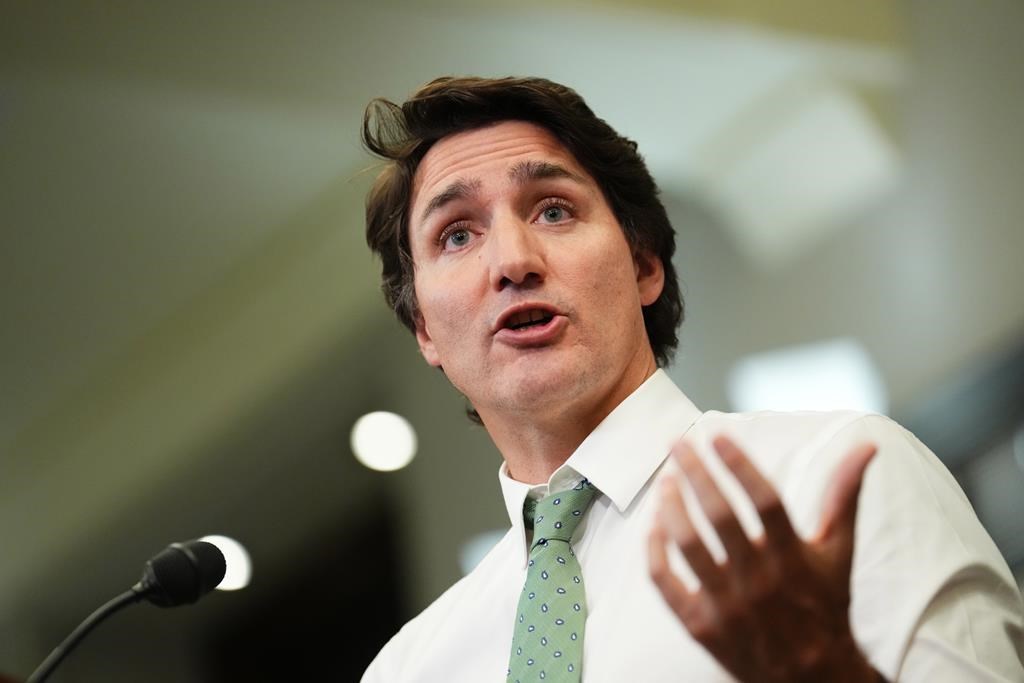
Saskatchewan and Alberta premiers ask for extension of carbon tax exemption
REGINA — Two of Canada's Prairie premiers say Ottawa's decision to exempt the carbon tax on heating oil fails to address affordability needs in Alberta and Saskatchewan.
 www.nsnews.com
www.nsnews.com
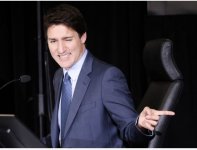
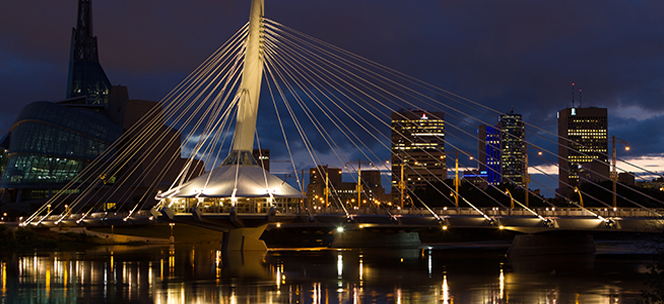
Manitoba politicians need to demand carbon tax relief
PS… we’ve been paying an escalating carbon tax for the privilege of heating our homes in the winter in Saskatchewan for almost 5 years now….& the Atlantic provinces “almost” had to start paying this fall/winter on heating oil….Where is the prairies are using natural gas for the most part, which burns a whole lot cleaner…but this is all about the environment and it isn’t about politics. Got it.
After years of refusing to make any such exemptions, Mr. Trudeau late on Thursday said the government would create a special carve-out to the broad-based levy and lift the tax on home-heating oil.
The change favours households in Atlantic Canada – where the Liberals have (?have?) their only rural stronghold – over those in other regions, because heating oil is disproportionately used on the East Coast.
Non-Maritime Premiers are demanding further exemptions from carbon pricing after Prime Minister Justin Trudeau gave relief to some households in a surprise policy change that experts warn undercuts the government’s climate plan.
The Prime Minister acknowledged that the carbon price was adding to affordability concerns and said the exemption was needed alongside an enhanced heat-pump program to ensure more households ditch home-heating oil. By leaving out other heating fuels, such as natural gas, premiers said the Prime Minister is again further dividing Canadians.
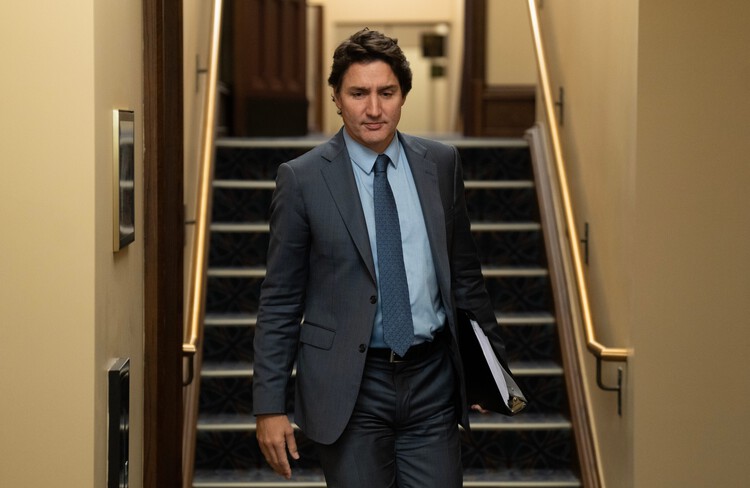
 apple.news
“While this is a step in the right direction, the vast majority of people in Ontario (Alberta, Saskatchewan, etc…) heat their homes and businesses with natural gas and will still have to pay the carbon tax,” said Premier Doug Ford on social media.
apple.news
“While this is a step in the right direction, the vast majority of people in Ontario (Alberta, Saskatchewan, etc…) heat their homes and businesses with natural gas and will still have to pay the carbon tax,” said Premier Doug Ford on social media.
For two years now, the federal Liberal government has sneered at every call to remove the carbon tax from fishermen, farmers, ranchers, truckers and grocers in order to keep Canadians’ food prices down. Apparently, your ability to put food on your family’s table is less important than its crusade to lower carbon emissions (and to look woke in the eyes of the world’s eco-activists).
The Trudeau government was so zealous about its carbon tax that not even the worst inflation in 40 years would change its mind.
So, if inflation and emissions were not responsible for Thursday’s announcement by the PM to take the carbon tax off home heating fuel, just what calculations were?
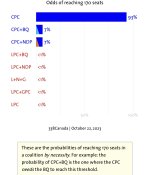
On Thursday, Trudeau announced home heating fuel would be exempt from the carbon tax for three years. Coincidentally, Atlantic Canada is the only region in which oil is used to heat a significant percentage of homes.
And Trudeau announced up to $15,000 per home for the installation of heat pumps in place of oil-fired furnaces. Again, Atlantic Canada turns out to be the only region where that applies broadly.

 apple.news
apple.news
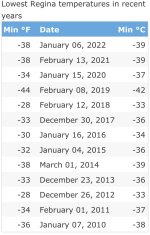
On the Prairies and in northern Ontario and northern Quebec, for instance, that won’t apply because most insurers will not insure homes that have only heat pumps where winter temperatures routinely fall below -20C. (Too much chance of the pipes freezing.)
The change favours households in Atlantic Canada – where the Liberals have (?have?) their only rural stronghold – over those in other regions, because heating oil is disproportionately used on the East Coast.
Non-Maritime Premiers are demanding further exemptions from carbon pricing after Prime Minister Justin Trudeau gave relief to some households in a surprise policy change that experts warn undercuts the government’s climate plan.
The Prime Minister acknowledged that the carbon price was adding to affordability concerns and said the exemption was needed alongside an enhanced heat-pump program to ensure more households ditch home-heating oil. By leaving out other heating fuels, such as natural gas, premiers said the Prime Minister is again further dividing Canadians.
Premiers demand more carbon-pricing carve-outs after Trudeau climbdown — The Globe and Mail
The government is also doubling the rural top-up in the carbon-price rebate for households
For two years now, the federal Liberal government has sneered at every call to remove the carbon tax from fishermen, farmers, ranchers, truckers and grocers in order to keep Canadians’ food prices down. Apparently, your ability to put food on your family’s table is less important than its crusade to lower carbon emissions (and to look woke in the eyes of the world’s eco-activists).
The Trudeau government was so zealous about its carbon tax that not even the worst inflation in 40 years would change its mind.
So, if inflation and emissions were not responsible for Thursday’s announcement by the PM to take the carbon tax off home heating fuel, just what calculations were?

On Thursday, Trudeau announced home heating fuel would be exempt from the carbon tax for three years. Coincidentally, Atlantic Canada is the only region in which oil is used to heat a significant percentage of homes.
And Trudeau announced up to $15,000 per home for the installation of heat pumps in place of oil-fired furnaces. Again, Atlantic Canada turns out to be the only region where that applies broadly.
GUNTER: Trudeau hoping to buy lost support in Atlantic provinces — Toronto Sun
What calculation was behind Prime Minister Justin Trudeau’s about-face on the carbon tax on Thursday? Was it that Environment and Climate Change Canada looked at Canada’s emission figures and concluded such a heavy carbon levy wasn’t needed to save the planet? A little bit lighter one would do...

On the Prairies and in northern Ontario and northern Quebec, for instance, that won’t apply because most insurers will not insure homes that have only heat pumps where winter temperatures routinely fall below -20C. (Too much chance of the pipes freezing.)
It is about the environment of Liberal insiders bank accounts.PS… we’ve been paying an escalating carbon tax for the privilege of heating our homes in the winter in Saskatchewan for almost 5 years now….& the Atlantic provinces “almost” had to start paying this fall/winter on heating oil….Where is the prairies are using natural gas for the most part, which burns a whole lot cleaner…but this is all about the environment and it isn’t about politics. Got it.
Looks like you are already paying far too much carbon scam tax. Maybe cut back a bit, and temperatures will climb to livable conditions.After years of refusing to make any such exemptions, Mr. Trudeau late on Thursday said the government would create a special carve-out to the broad-based levy and lift the tax on home-heating oil.
The change favours households in Atlantic Canada – where the Liberals have (?have?) their only rural stronghold – over those in other regions, because heating oil is disproportionately used on the East Coast.
Non-Maritime Premiers are demanding further exemptions from carbon pricing after Prime Minister Justin Trudeau gave relief to some households in a surprise policy change that experts warn undercuts the government’s climate plan.
The Prime Minister acknowledged that the carbon price was adding to affordability concerns and said the exemption was needed alongside an enhanced heat-pump program to ensure more households ditch home-heating oil. By leaving out other heating fuels, such as natural gas, premiers said the Prime Minister is again further dividing Canadians.
“While this is a step in the right direction, the vast majority of people in Ontario (Alberta, Saskatchewan, etc…) heat their homes and businesses with natural gas and will still have to pay the carbon tax,” said Premier Doug Ford on social media.
Premiers demand more carbon-pricing carve-outs after Trudeau climbdown — The Globe and Mail
The government is also doubling the rural top-up in the carbon-price rebate for householdsapple.news
For two years now, the federal Liberal government has sneered at every call to remove the carbon tax from fishermen, farmers, ranchers, truckers and grocers in order to keep Canadians’ food prices down. Apparently, your ability to put food on your family’s table is less important than its crusade to lower carbon emissions (and to look woke in the eyes of the world’s eco-activists).
The Trudeau government was so zealous about its carbon tax that not even the worst inflation in 40 years would change its mind.
So, if inflation and emissions were not responsible for Thursday’s announcement by the PM to take the carbon tax off home heating fuel, just what calculations were?
View attachment 19806
On Thursday, Trudeau announced home heating fuel would be exempt from the carbon tax for three years. Coincidentally, Atlantic Canada is the only region in which oil is used to heat a significant percentage of homes.
And Trudeau announced up to $15,000 per home for the installation of heat pumps in place of oil-fired furnaces. Again, Atlantic Canada turns out to be the only region where that applies broadly.
View attachment 19807
GUNTER: Trudeau hoping to buy lost support in Atlantic provinces — Toronto Sun
What calculation was behind Prime Minister Justin Trudeau’s about-face on the carbon tax on Thursday? Was it that Environment and Climate Change Canada looked at Canada’s emission figures and concluded such a heavy carbon levy wasn’t needed to save the planet? A little bit lighter one would do...apple.news
On the Prairies and in northern Ontario and northern Quebec, for instance, that won’t apply because most insurers will not insure homes that have only heat pumps where winter temperatures routinely fall below -20C. (Too much chance of the pipes freezing.)
When I first heard my Father & some Friends of his talking about Global Warming in the Early ‘70’s over Dark Rum & Coca Cola, I was quite young and had to ask what they were talking about.Looks like you are already paying far too much carbon scam tax. Maybe cut back a bit, and temperatures will climb to livable conditions.
He stated that if if was real, we might be growing Oranges out on the Prairies in fifty years!! It’s fifty years later now…so thank God those Carbon Taxes (plural) came along and saved us when they did. Close call.
Alberta Energy Minister Brian Jean said Wednesday that the cap was an unlawful attempt by Ottawa to control the province’s constitutional rights, which include jurisdiction over natural resources. “We will be fighting it every step of the way,” he said.
I’ve heard that the Alberta premiere from COP28 supposed to be making a comment regarding this… moving goalpost dates from 2050 to 2030 again, etc…
The federal government is proposing a minimum emissions cap on the oil and gas sector as well as a legal upper limit that the industry can meet by paying for offsets if it can’t cut the additional emissions directly.
Operators that don’t meet the targets will face consequences depending on the severity of the infraction. Non-compliance will be assessed on a case-by-case basis, ranging anywhere from a warning letter or a directive to take corrective action, up to legal action and financial penalties.
In a policy framework released Thursday morning, Ottawa said it wants to see Canada’s biggest polluting sector cut emissions by 20 to 23 per cent below 2019 levels by 2030.

 apple.news
apple.news
I’ve heard that the Alberta premiere from COP28 supposed to be making a comment regarding this… moving goalpost dates from 2050 to 2030 again, etc…
Operators that don’t meet the targets will face consequences depending on the severity of the infraction. Non-compliance will be assessed on a case-by-case basis, ranging anywhere from a warning letter or a directive to take corrective action, up to legal action and financial penalties.
In a policy framework released Thursday morning, Ottawa said it wants to see Canada’s biggest polluting sector cut emissions by 20 to 23 per cent below 2019 levels by 2030.
Canada proposes minimum 20-23% emissions cut from oil and gas sector, industry to pay for additional offsets — The Globe and Mail
Operators that miss targets face consequences depending on the infraction and will be assessed on a case-by-case basis
They're going to bulldoze Parliament?Ottawa said it wants to see Canada’s biggest polluting sector cut emissions by 20 to 23 per cent below 2019 levels by 2030.
Although the emissions targets for the cap are lower than previously expected, the reaction from Alberta was withering.
“Our province is simply done with what amounts to a steady stream of economic sanctions and punitive measures thrown upon our citizens and businesses to intentionally damage their livelihoods and the economic engine that disproportionately powers our national economy and the programs that Canadians rely on,” said Alberta Premier Danielle Smith, in a statement following the government’s announcement.
Canada’s original emissions target of 30 per cent below 2005 levels by 2030 was brushed aside last year for a new goal of 40 to 45 per cent below 2005 levels by 2030. Leach said the government was likely on track for the original goal, but the new one will be difficult, and especially so if any more increases to the carbon tax are seen as politically impossible.
The politics of the carbon tax have dominated Parliament Hill this fall, at least partly because the Conservatives see it as a slam dunk vote-winner. A recent decision by the government to exempt home heating oil from the carbon tax for three years, which was widely seen as an attempt to put a lid on discontent in the Atlantic provinces, has provoked a series of similar requests across the country.
Provincial premiers in the Prairies demanded a similar exemption and a carbon-tax exemption bill for farm heating caused an uproar in the Senate before being sent to parliamentary purgatory in the House of Commons. Conservative Leader Pierre Poilievre also unveiled a motion on Thursday morning calling on the government to “repeal the carbon tax on farmers, First Nations and families.”
And as the government’s resolve to defend the carbon tax seems to weaken, and Canadians tell pollsters they have soured on the policy, it has been declared “dead” by some commentators and described as irreparably compromised by its supporters.
Not only will the emissions cap be less efficient than a carbon tax, but Tombe also fears it will further undermine the case for the carbon tax among Canadians and businesses. While a carbon tax doesn’t discriminate, because it seeks to lower emissions wherever in Canada it is cheapest to do so, the emissions cap directly targets the oil and gas industry in Alberta.
Tombe worries that will “inflame tensions” in the country.
“That’s why I can’t avoid interpreting the government’s move as just purely political calculation and setting up wedge issues. In particular, setting up Alberta as a boogeyman and ignoring the fact that Quebec is lagging the rest of the country in a meaningful way (on its climate policies),” said Tombe.

 apple.news
apple.news
Earlier this year, economists Chris Ragan, Paul Rochon and Mark Jaccard argued that the discussion about the need for a sector-specific emissions cap sounds a lot like arguments in favour of phasing out the oil sands.
It is important, the authors wrote, that the government makes a “crucial distinction” between cutting emissions and fossil fuel production itself, which would be economically devastating for the country.
“The bottom line is straightforward: an intentional phase-out of oil and gas production is not necessary for Canada to achieve its net zero target, and the costs of using such a policy approach would likely be enormous. To reduce the overall cost of achieving the 2050 target, the government should be encouraged to pursue policies that apply more-or-less equally to all sectors and regions of the country,” they write.
“Our province is simply done with what amounts to a steady stream of economic sanctions and punitive measures thrown upon our citizens and businesses to intentionally damage their livelihoods and the economic engine that disproportionately powers our national economy and the programs that Canadians rely on,” said Alberta Premier Danielle Smith, in a statement following the government’s announcement.
Canada’s original emissions target of 30 per cent below 2005 levels by 2030 was brushed aside last year for a new goal of 40 to 45 per cent below 2005 levels by 2030. Leach said the government was likely on track for the original goal, but the new one will be difficult, and especially so if any more increases to the carbon tax are seen as politically impossible.
The politics of the carbon tax have dominated Parliament Hill this fall, at least partly because the Conservatives see it as a slam dunk vote-winner. A recent decision by the government to exempt home heating oil from the carbon tax for three years, which was widely seen as an attempt to put a lid on discontent in the Atlantic provinces, has provoked a series of similar requests across the country.
Provincial premiers in the Prairies demanded a similar exemption and a carbon-tax exemption bill for farm heating caused an uproar in the Senate before being sent to parliamentary purgatory in the House of Commons. Conservative Leader Pierre Poilievre also unveiled a motion on Thursday morning calling on the government to “repeal the carbon tax on farmers, First Nations and families.”
And as the government’s resolve to defend the carbon tax seems to weaken, and Canadians tell pollsters they have soured on the policy, it has been declared “dead” by some commentators and described as irreparably compromised by its supporters.
Not only will the emissions cap be less efficient than a carbon tax, but Tombe also fears it will further undermine the case for the carbon tax among Canadians and businesses. While a carbon tax doesn’t discriminate, because it seeks to lower emissions wherever in Canada it is cheapest to do so, the emissions cap directly targets the oil and gas industry in Alberta.
Tombe worries that will “inflame tensions” in the country.
“That’s why I can’t avoid interpreting the government’s move as just purely political calculation and setting up wedge issues. In particular, setting up Alberta as a boogeyman and ignoring the fact that Quebec is lagging the rest of the country in a meaningful way (on its climate policies),” said Tombe.
Emissions cap shows the government is 'backing away' from the unpopular carbon tax — National Post
The policy may be symbolic of the Liberal government's declining zeal for what was once its flagship policy
Earlier this year, economists Chris Ragan, Paul Rochon and Mark Jaccard argued that the discussion about the need for a sector-specific emissions cap sounds a lot like arguments in favour of phasing out the oil sands.
It is important, the authors wrote, that the government makes a “crucial distinction” between cutting emissions and fossil fuel production itself, which would be economically devastating for the country.
“The bottom line is straightforward: an intentional phase-out of oil and gas production is not necessary for Canada to achieve its net zero target, and the costs of using such a policy approach would likely be enormous. To reduce the overall cost of achieving the 2050 target, the government should be encouraged to pursue policies that apply more-or-less equally to all sectors and regions of the country,” they write.
I hope it works. I think all the premieres should be telling Ottawa to go F itself. Scott Moe and Danielle Smith shouldn't have to stand alone, but Manitoba's Premier Wab Kinew and the other Premier David Eby in BC are Kool-Aid drinking NDP, so there's no help there. Not sure what Doug Ford will do, one minute he's calling him the devil the next he's praising his leadership. As for recent developments, I hope PP grinds the government to a halt. Man, we need an election. THe people of Canada need recall power in our constitution.
I hope it works. I think all the premieres should be telling Ottawa to go F itself. Scott Moe and Danielle Smith shouldn't have to stand alone, but Manitoba's Premier Wab Kinew and the other Premier David Eby in BC are Kool-Aid drinking NDP, so there's no help there. Not sure what Doug Ford will do, one minute he's calling him the devil the next he's praising his leadership. As for recent developments, I hope PP grinds the government to a halt. Man, we need an election. THe people of Canada need recall power in our constitution.

‘Double whammy:’ Eyre says Sask. has been slammed by another federal regulation
Bronwyn Eyre said the feds' new oil and gas emissions cap will result in a production cut.
 www.cjme.com
www.cjme.com
Manitoba has already had a taste of “You had a plan, but it wasn’t Liberal-Approved Enough so…” sort’a thing. BC (outside of the Greater-Vancouver area) is like the rest of Western Canada…
The Liberals’ enviro-cultist-in-chief, Steven Guilbeault, announced Thursday in Dubai, what he himself called “strict” new emissions caps. Except these new caps apply only to the West’s oil-and-gas industry. Not to Ontario and Quebec car-making, not to B.C. mining or logging, not to Atlantic Canada’s coal-fired power plants or its home heating fuel.
Guilbeault said the oil-and-gas industry is the biggest contributor of carbon emissions in the country, which it is. Yet he went on to claim it accounted for 28% of the total, even though StatsCan says the total is under 24%. Could that be because manufacturing in Ontario and Quebec accounts for 22%, so Guilbeault had to pump up the oil-and-gas numbers to justify singling it out?
Smith called the new requirements “a de facto production cap,” because they cannot be achieved without reducing production. That is largely because eco-extremists like Guilbeault and much of the environmental movement have soured on carbon capture. And if oil-and-gas companies cannot capture, store and repurpose their carbon emissions, then the only way to meet the Liberals’ targets is to shut down production.
“This amounts to an intentional attack by the federal government on the economy of Alberta and the financial well-being of millions of Albertans and Canadians,” plus the health, education and social programs funded by energy revenues, Smith said.
Oil-and-gas emissions have risen over the past decade, but only about six per cent when compared to the 41% increase in GDP.
Guilbeault thinks he will get this new federal intrusion past the courts because he is now proposing only a 35% to 38% reduction rather than 42%. But he has had no input from the provinces, which is the reason Ottawa lost two courts cases on eco issues in the past two months.
The cap is unconstitutional and obnoxious.
The fact the Liberals chose to make their announcement at an international eco conference rather than in the country just adds insult to injury.
GUNTER: 'Strict' emissions caps put Trudeau first, Alberta last — Toronto Sun
The dark days of the 1980s National Energy Program (NEP) are back. Not since Pierre Trudeau’s massive cash grab of oil-and-gas revenues and power grab for constitutional jurisdiction, has Ottawa so blatantly singled out one province and one industry for attack. And this time might be even worse...
Bell: Smith on Trudeau, Guilbeault — 'We're going to keep hitting' — Calgary Sun
For Smith, this battle is real world stuff
Bell: Neither Danielle Smith nor Ottawa blinks in a game of chicken — Calgary Sun
The Liberal government will go ahead and do what Premier Danielle Smith did not want done. What Smith and her government are fighting against
Some Canadian oil and gas producers say they will not rush to accelerate emissions cuts until they see if unpopular Prime Minister Justin Trudeau survives long enough to implement his proposed oil and gas emissions cap.
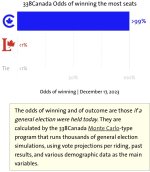
The long-delayed framework, released this month, demands oil companies in Canada cut carbon emissions by up to 38% by 2030 from 2019 levels. But polls show the opposition Conservatives led by Pierre Poilievre - who oppose the cap - with a commanding lead over Trudeau's Liberals before an expected 2025 election, raising the prospect that plans for the cap will be abandoned.
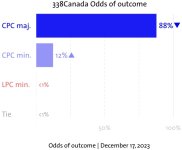
Canada's main oil-producing province Alberta has also vowed to develop a "constitutional shield" against the cap.
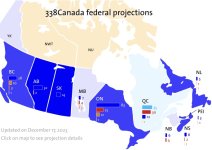
Some small- and medium-sized oil companies are openly asking if the Liberals losing in the 2025 election would avert the need to accelerate emissions cuts. Canada is the world's fourth-biggest crude producer and the oil and gas industry is the country's highest-polluting sector, accounting for more than a quarter of all emissions.
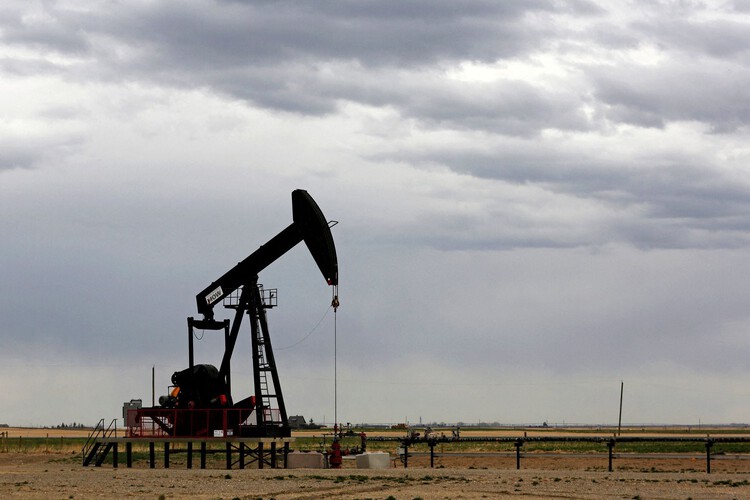
 apple.news
Resistance from small and mid-cap producers underscores the rift between the Liberal government's climate policies, some of which have been rejected by the courts, and a sector critically important to Canada's economy.
apple.news
Resistance from small and mid-cap producers underscores the rift between the Liberal government's climate policies, some of which have been rejected by the courts, and a sector critically important to Canada's economy.
Shannon Stubbs, the Conservative shadow minister for natural resources, said the emissions cap represents federal over-reach into provincial jurisdiction.

The long-delayed framework, released this month, demands oil companies in Canada cut carbon emissions by up to 38% by 2030 from 2019 levels. But polls show the opposition Conservatives led by Pierre Poilievre - who oppose the cap - with a commanding lead over Trudeau's Liberals before an expected 2025 election, raising the prospect that plans for the cap will be abandoned.

Canada's main oil-producing province Alberta has also vowed to develop a "constitutional shield" against the cap.

Some small- and medium-sized oil companies are openly asking if the Liberals losing in the 2025 election would avert the need to accelerate emissions cuts. Canada is the world's fourth-biggest crude producer and the oil and gas industry is the country's highest-polluting sector, accounting for more than a quarter of all emissions.
Some Canadian oil firms await Trudeau's fate rather than cut emissions faster — Reuters
Some Canadian oil and gas producers say they will not rush to accelerate emissions cuts until they see if unpopular Prime Minister Justin Trudeau survives long enough to implement his proposed oil and gas emissions cap.
Shannon Stubbs, the Conservative shadow minister for natural resources, said the emissions cap represents federal over-reach into provincial jurisdiction.
The Trudeau Liberals are on their way to inciting a consumer revolt, said Alberta Premier Danielle Smith in a year-end interview.
If Canadians are about to become unruly, can you blame them? This is, after all, a federal government that never saw a dollar in your pocket that it wasn’t itching to spend 10 times over.
And now, in a lightning round of federal proclamations, each more bug-eyed and grandiose than the next, the Liberals make clear they will demand new and massive changes on critical aspects of our economy and way of life.
The federal government is coming for our power plants, our cement and plastics, our oil and gas.
It’s coming for our internal combustion engines, cars and trucks.
It’s coming for fertilizer for our farmers’ fields and also for our gas stoves and gas furnaces.
Nothing is so efficient and useful that it can’t be rubbished, it seems, at least when they bump up against ostentatious schemes to save the world, or at least to subsidize Liberal-friendly solar, wind and battery interests.
How does this all end?

 edmontonjournal.com
edmontonjournal.com
Smith expects Jagmeet Singh’s NDP will prop up the Liberals for two more years.
“We’ll see whether or not there’s a consumer revolt. I’m expecting there will be. When you find out your electricity bills are high, or you have instability in the grid and you have a black-out, or you can’t buy a car, or you’re being told you have to phase out your natural gas heating and have a heat pump instead in an environment where it doesn’t work, that’s when it gets real for people.”
The most recent example of how unhinged Liberal thinking is on climate change came two weeks ago when Energy Minister Jonathan Wilkinson joined with Guilbeault to announce the world’s most aggressive emissions cap, though, of course, only for our own Canadian oil and gas sector.
Said Wilkinson, “We talk a lot about climate change these days for a very good reason — the planet is at risk of burning up.”
No sane and realistic climate scientist supports the notion of an impending worldwide apocalypse of fire. But alarmism is the main rhetorical plank of the Trudeau Liberal climate policy.
If Canadians are about to become unruly, can you blame them? This is, after all, a federal government that never saw a dollar in your pocket that it wasn’t itching to spend 10 times over.
And now, in a lightning round of federal proclamations, each more bug-eyed and grandiose than the next, the Liberals make clear they will demand new and massive changes on critical aspects of our economy and way of life.
The federal government is coming for our power plants, our cement and plastics, our oil and gas.
It’s coming for our internal combustion engines, cars and trucks.
It’s coming for fertilizer for our farmers’ fields and also for our gas stoves and gas furnaces.
Nothing is so efficient and useful that it can’t be rubbished, it seems, at least when they bump up against ostentatious schemes to save the world, or at least to subsidize Liberal-friendly solar, wind and battery interests.
How does this all end?

David Staples: Danielle Smith predicts 'consumer revolt' over green schemes
The Trudeau Liberals are on their way to inciting a consumer revolt, said Alberta Premier Danielle Smith in a year-end interview.
Smith expects Jagmeet Singh’s NDP will prop up the Liberals for two more years.
“We’ll see whether or not there’s a consumer revolt. I’m expecting there will be. When you find out your electricity bills are high, or you have instability in the grid and you have a black-out, or you can’t buy a car, or you’re being told you have to phase out your natural gas heating and have a heat pump instead in an environment where it doesn’t work, that’s when it gets real for people.”
The most recent example of how unhinged Liberal thinking is on climate change came two weeks ago when Energy Minister Jonathan Wilkinson joined with Guilbeault to announce the world’s most aggressive emissions cap, though, of course, only for our own Canadian oil and gas sector.
Said Wilkinson, “We talk a lot about climate change these days for a very good reason — the planet is at risk of burning up.”
No sane and realistic climate scientist supports the notion of an impending worldwide apocalypse of fire. But alarmism is the main rhetorical plank of the Trudeau Liberal climate policy.
Everyone has an “other,” an enemy, because there always must be a threat on the horizon, real or imagined, that pushes one’s own society to do better. For the Medieval Brits, it was the French; for the Victorian Brits, it was also the French, as well as the Turks.
For Prime Minister Justin Trudeau, it’s Alberta.
This is nothing new: Alberta has always been the black sheep province to this government, but it doesn’t hurt to have a refresher as to why. Trudeau kindly provided one this week on a delegation to the frontier, during which time he explained on Edmonton-based podcast, Real Talk with Ryan Jespersen, the failings of the Albertan mind.
“The world is looking at net-zero right now, but right-wing ideology is getting in the way of Alberta’s success,” he said.

Trudeau was frustrated at the inadequate pace of Alberta’s shift to renewable energy — and the pesky resistance the province puts up in the face of Ottawa. Albertans, oil workers in particular, are well-meaning people with solid potential, but have unfortunately fallen from grace. Here’s an example of one (abridged) exchange.
Trudeau: “Albertans are getting fooled by right-wing politicians.”
Jespersen: “They feel that it’s you that’s been imposing Liberal ideology onto the oilsands.”
Trudeau: “What have we imposed on the oilsands?”
The prime minister seemed to be ignorant to the numerous legal adjustments he’s made to the energy sector in his time in charge. There’s the federal carbon tax, which mandates a rising minimum carbon price backstop to be paid by industrial emitters — and which adds to the daily cost of life of every Albertan.
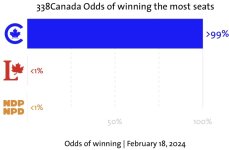
There’s the Liberal overhaul to environmental assessment legislation, which greatly constricted natural resource development — so much so that it was later found to be largely unconstitutional for regulating beyond federal jurisdiction. Then, there’s everything else in the works, like the proposed emissions cap on the oil and gas industry.
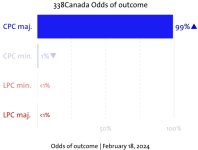
Still, it’s the Albertans who are mis-thinking here, according to Trudeau.
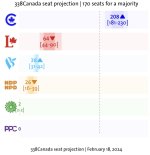
“That is what is hurting oilsands workers, and they’ve been fooled by people who are saying, ‘Oh no, climate change is a Liberal, or Chinese plot, you don’t have to worry about it, just keep doing things exactly as they were a decade ago.”
It’s a caricature, but it’s a useful one for Trudeau, who has very little else to position himself against. Foreign nations are largely off-limits, as “othering” anyone during a period of near-religious adherence to Official Multiculturalism is simply out of the question.
Expanded upon here:

 apple.news
For a proper foe, he has to look inward.
apple.news
For a proper foe, he has to look inward.
Alberta is a perfectly-positioned opponent to Ottawa. Offending its people will not lead to any significant loss of seats — the Liberals won four Alberta seats in 2015, which is a great performance, historically-speaking. Since then, all but one of these seats has been lost. Albertans aren’t disproportionately in power-broker roles in the federal public service, unlike fellow rabble-rouser Quebec.
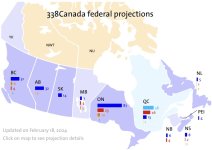
And importantly, the image of a science-disbelieving, anti-innovation, non-progressive redneck in a gas-burning truck driving ruts around uncapped and abandoned oil wells — an image evoked in Trudeau’s podcast soliloquy — is an easy opponent to ridicule. It doesn’t violate the rules of diversity and inclusion, importantly, the “stereotypical Albertan” wasn’t assigned systemic disadvantage at birth. Instead, Albertans have squandered their many advantages, and it just so happens that it fell to Trudeau to give them some tough, reformative love.

Alberta and its oil and gas industry aren’t the biggest enemy of this country. Emissions are higher in the province, sure — but that’s a factor of the natural resources hand that was dealt here. Environmental standards are high, and reclamation projects are an expensive but rewarding fact of life. The corporate players, Trudeau’s villainous polluters, have poured billions into innovation and are shooting for net-zero by 2050 — not fast enough for Trudeau’s liking, but laudable nonetheless.
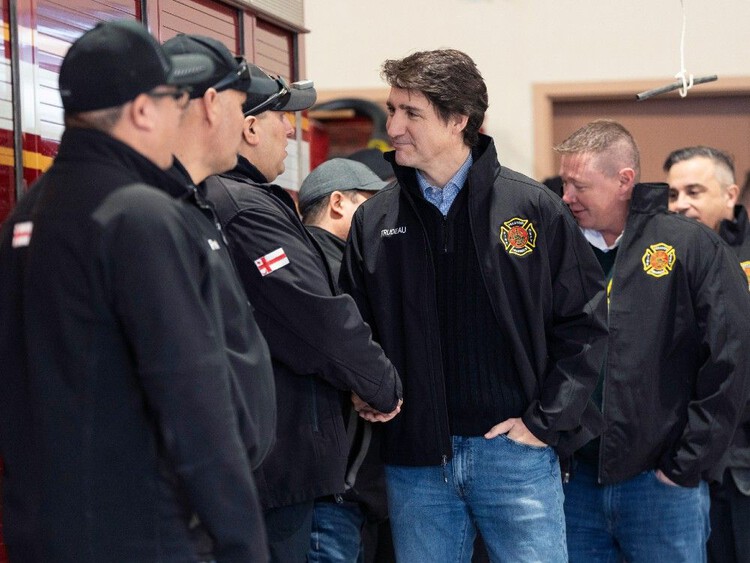
 apple.news
Would it be better for Canada if China was positioned as the enemy instead? Sure, but this place is run by cowards who would rather attack their own.
apple.news
Would it be better for Canada if China was positioned as the enemy instead? Sure, but this place is run by cowards who would rather attack their own.
For Prime Minister Justin Trudeau, it’s Alberta.
“The world is looking at net-zero right now, but right-wing ideology is getting in the way of Alberta’s success,” he said.

Trudeau was frustrated at the inadequate pace of Alberta’s shift to renewable energy — and the pesky resistance the province puts up in the face of Ottawa. Albertans, oil workers in particular, are well-meaning people with solid potential, but have unfortunately fallen from grace. Here’s an example of one (abridged) exchange.
Trudeau: “Albertans are getting fooled by right-wing politicians.”
Jespersen: “They feel that it’s you that’s been imposing Liberal ideology onto the oilsands.”
Trudeau: “What have we imposed on the oilsands?”
The prime minister seemed to be ignorant to the numerous legal adjustments he’s made to the energy sector in his time in charge. There’s the federal carbon tax, which mandates a rising minimum carbon price backstop to be paid by industrial emitters — and which adds to the daily cost of life of every Albertan.

There’s the Liberal overhaul to environmental assessment legislation, which greatly constricted natural resource development — so much so that it was later found to be largely unconstitutional for regulating beyond federal jurisdiction. Then, there’s everything else in the works, like the proposed emissions cap on the oil and gas industry.

Still, it’s the Albertans who are mis-thinking here, according to Trudeau.

“That is what is hurting oilsands workers, and they’ve been fooled by people who are saying, ‘Oh no, climate change is a Liberal, or Chinese plot, you don’t have to worry about it, just keep doing things exactly as they were a decade ago.”
It’s a caricature, but it’s a useful one for Trudeau, who has very little else to position himself against. Foreign nations are largely off-limits, as “othering” anyone during a period of near-religious adherence to Official Multiculturalism is simply out of the question.
Expanded upon here:
Jamie Sarkonak: Trudeau slides into Alberta to deny he is kneecapping the oilsands — National Post
The prime minister can't stop treating us like the 'other'
Alberta is a perfectly-positioned opponent to Ottawa. Offending its people will not lead to any significant loss of seats — the Liberals won four Alberta seats in 2015, which is a great performance, historically-speaking. Since then, all but one of these seats has been lost. Albertans aren’t disproportionately in power-broker roles in the federal public service, unlike fellow rabble-rouser Quebec.

And importantly, the image of a science-disbelieving, anti-innovation, non-progressive redneck in a gas-burning truck driving ruts around uncapped and abandoned oil wells — an image evoked in Trudeau’s podcast soliloquy — is an easy opponent to ridicule. It doesn’t violate the rules of diversity and inclusion, importantly, the “stereotypical Albertan” wasn’t assigned systemic disadvantage at birth. Instead, Albertans have squandered their many advantages, and it just so happens that it fell to Trudeau to give them some tough, reformative love.

Alberta and its oil and gas industry aren’t the biggest enemy of this country. Emissions are higher in the province, sure — but that’s a factor of the natural resources hand that was dealt here. Environmental standards are high, and reclamation projects are an expensive but rewarding fact of life. The corporate players, Trudeau’s villainous polluters, have poured billions into innovation and are shooting for net-zero by 2050 — not fast enough for Trudeau’s liking, but laudable nonetheless.
Trudeau says Albertans have been misled into opposing his 'conservative' carbon tax — National Post
The Prime Minister also said the transformation of the energy sector is 'not a plot' to phase out oilsands
WTF is right wing ideology?Everyone has an “other,” an enemy, because there always must be a threat on the horizon, real or imagined, that pushes one’s own society to do better. For the Medieval Brits, it was the French; for the Victorian Brits, it was also the French, as well as the Turks.
For Prime Minister Justin Trudeau, it’s Alberta.
This is nothing new: Alberta has always been the black sheep province to this government, but it doesn’t hurt to have a refresher as to why. Trudeau kindly provided one this week on a delegation to the frontier, during which time he explained on Edmonton-based podcast, Real Talk with Ryan Jespersen, the failings of the Albertan mind.
“The world is looking at net-zero right now, but right-wing ideology is getting in the way of Alberta’s success,” he said.
Trudeau was frustrated at the inadequate pace of Alberta’s shift to renewable energy — and the pesky resistance the province puts up in the face of Ottawa. Albertans, oil workers in particular, are well-meaning people with solid potential, but have unfortunately fallen from grace. Here’s an example of one (abridged) exchange.
Trudeau: “Albertans are getting fooled by right-wing politicians.”
Jespersen: “They feel that it’s you that’s been imposing Liberal ideology onto the oilsands.”
Trudeau: “What have we imposed on the oilsands?”
The prime minister seemed to be ignorant to the numerous legal adjustments he’s made to the energy sector in his time in charge. There’s the federal carbon tax, which mandates a rising minimum carbon price backstop to be paid by industrial emitters — and which adds to the daily cost of life of every Albertan.
There’s the Liberal overhaul to environmental assessment legislation, which greatly constricted natural resource development — so much so that it was later found to be largely unconstitutional for regulating beyond federal jurisdiction. Then, there’s everything else in the works, like the proposed emissions cap on the oil and gas industry.
Still, it’s the Albertans who are mis-thinking here, according to Trudeau.
“That is what is hurting oilsands workers, and they’ve been fooled by people who are saying, ‘Oh no, climate change is a Liberal, or Chinese plot, you don’t have to worry about it, just keep doing things exactly as they were a decade ago.”
It’s a caricature, but it’s a useful one for Trudeau, who has very little else to position himself against. Foreign nations are largely off-limits, as “othering” anyone during a period of near-religious adherence to Official Multiculturalism is simply out of the question.
Expanded upon here:
For a proper foe, he has to look inward.
Jamie Sarkonak: Trudeau slides into Alberta to deny he is kneecapping the oilsands — National Post
The prime minister can't stop treating us like the 'other'apple.news
Alberta is a perfectly-positioned opponent to Ottawa. Offending its people will not lead to any significant loss of seats — the Liberals won four Alberta seats in 2015, which is a great performance, historically-speaking. Since then, all but one of these seats has been lost. Albertans aren’t disproportionately in power-broker roles in the federal public service, unlike fellow rabble-rouser Quebec.
View attachment 21261
And importantly, the image of a science-disbelieving, anti-innovation, non-progressive redneck in a gas-burning truck driving ruts around uncapped and abandoned oil wells — an image evoked in Trudeau’s podcast soliloquy — is an easy opponent to ridicule. It doesn’t violate the rules of diversity and inclusion, importantly, the “stereotypical Albertan” wasn’t assigned systemic disadvantage at birth. Instead, Albertans have squandered their many advantages, and it just so happens that it fell to Trudeau to give them some tough, reformative love.
Alberta and its oil and gas industry aren’t the biggest enemy of this country. Emissions are higher in the province, sure — but that’s a factor of the natural resources hand that was dealt here. Environmental standards are high, and reclamation projects are an expensive but rewarding fact of life. The corporate players, Trudeau’s villainous polluters, have poured billions into innovation and are shooting for net-zero by 2050 — not fast enough for Trudeau’s liking, but laudable nonetheless.
Would it be better for Canada if China was positioned as the enemy instead? Sure, but this place is run by cowards who would rather attack their own.
Trudeau says Albertans have been misled into opposing his 'conservative' carbon tax — National Post
The Prime Minister also said the transformation of the energy sector is 'not a plot' to phase out oilsandsapple.news